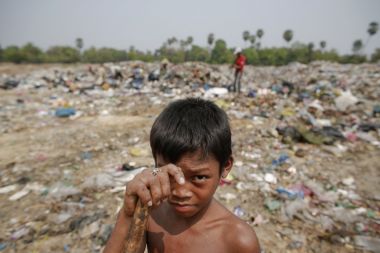Ending extreme poverty is a 'moral and spiritual imperative' say faith leaders

More than 30 faith leaders have launched a call to action to end "the scourge of extreme poverty" by 2030.
Religious leaders have joined the heads of faith-based organisations to issue a declaration, which states: "For the first time in human history, we can do more than simply envision a world free of extreme poverty; we can make it a reality."
Signatories include the executive director of the Anglican Alliance, Rev Rachel Carnegie, secretary general of Caritas Internationalis, Michael Roy, Sojourner's Jim Wallis, the chief executive officer of Islamic Relief International, Dr Mohamed Ashmawey and the president of World Vision International, Kevin Jenkins.
Their joint statement, released yesterday, praises the progress made so far by cutting the number of people living in extreme poverty by half. According to the most recent estimates by the World Bank Group, 17 per cent of people in the developing world lived at or below $1.25 a day in 2011, a fall from 43 per cent in 1990 and 52 per cent in 1981. There are currently thought to be about 1.2 billion people living in extreme poverty.
"We have ample evidence from the World Bank Group and others showing that we can now end extreme poverty within fifteen years," the statement reads.
"In 2015, our governments will be deciding upon a new global sustainable development agenda that has the potential to build on our shared values to finish the urgent task of ending extreme poverty.
"We in the faith community embrace this moral imperative because we share the belief that the moral test of our society is how the weakest and most vulnerable are faring. Our sacred texts also call us to combat injustice and uplift the poorest in our midst. No one, regardless of sex, age, race, or belief, should be denied experiencing the fullness of life."
Extreme poverty "thwarts human purpose, chokes human potential, and affronts human dignity," the statement adds. "In our increasingly interconnected world, there is enough to ensure that no one has to fight for their daily survival... Until each and every person is afforded the same basic rights, none of us can truly flourish."
The faith leaders call for a comprehensive approach, noting that the underlying causes of poverty, and not just its symptoms, need to be addressed. "It calls for a holistic and sustainable approach that transforms cultures and institutions, and hearts as well as minds," they say. Climate change, which affects the world's most vulnerable communities most, must be addressed, as well as the second-class treatment of women and girls in many parts of the world.
"Our shared convictions call us to empower and uplift – not denigrate – those living in poverty, so that they can become agents of their own transformation. We must abandon a politics that too often marginalizes their voices, blames them for their condition, and exacerbates extremes of inequality. Now is the time to turn fatigue into renewed commitment, indifference into compassion, cynicism into hope, and impotence into a greater sense of agency that we can and will end extreme poverty by 2030," the statement concludes.
"Poverty's imprisonment of more than a billion men, women and children must end. Now is the time to boldly act to free the next generation from extreme poverty's grip."
Another of the signatories, President of Bread for the World – a Christian organisation working to end hunger – David Beckmann, said faith communities were committing to increase their advocacy on behalf of the world's poor. "The unprecedented progress that the world is making against hunger and poverty is an example of our loving God moving in the contemporary world, and God is inviting us all to get with the program," he said.
Jim Yong Kim, President of the World Bank Group, which supported the faith leaders' declaration, said the organisation would continue to work with them to end extreme poverty.
"The moral imperative can help drive the movement to end poverty by 2030 by inspiring large communities to act now and to advocate for governments to do the same," he said.
"These commitments from religious leaders come at just the right time – their actions can help hundreds of millions of people lift themselves out of poverty."











